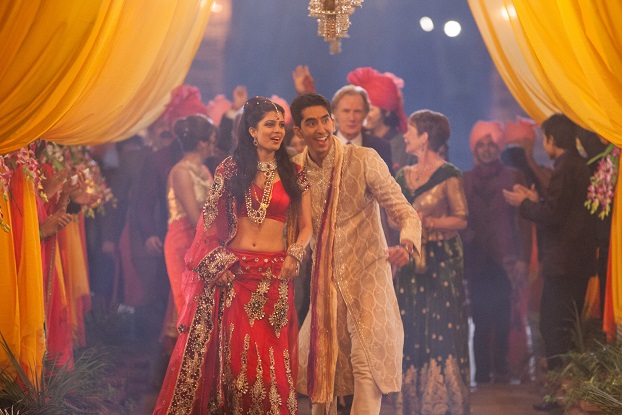
The unexpected 2011 hit The Best Exotic Marigold Hotel centered on a group of elderly Brits who, upon learning that their retirement home in India is more decrepit than deluxe, must find ways to make the most of their unexpected surroundings. Throughout it, bumbling but lovable hotelier Sonny Kapoor (Dev Patel) uttered the oddly reassuring refrain, one that many of us no doubt adopted as one of our own mantras later — “Everything is okay in the end, and if it’s not okay, it’s not the end.”
The thing is, by the conclusion of that spectacularly charming film, everything did seem to be quite okay — which, by Sonny’s own rules, would have been reason enough to stop at just one. But after its $46+ million gross earnings (in the U.S alone!), who can blame director John Madden for wanting to keep the story going?
And so begins the next chapter, picking up eight months from where we left off. The camera opens to a convertible cruising down Route 66, with Sonny and co-manager Muriel (Maggie Smith) en route to San Diego in an attempt to entice investors for the expansion of their now-thriving Marigold Hotel. They return to Jaipur expecting business as usual amidst full-swing preparations for Sonny and Sunaina’s (Tina Desai) nuptials, but are unprepared for a few impending surprises: Kushal (Shazad Latif) a family friend whose general ability to best Sonny at most things has the latter in an envy-fueled tizzy, and the arrival of Guy Chambers (Richard Gere) an American with an instant affinity for Sonny’s mother (Lillette Dubey), and whom Sonny pegs as an undercover inspector planted by the California investors to gauge whether the Marigold is fit to be franchised.
Meanwhile, Evelyn (Judi Dench) and Douglas (Bill Nighy) carry out their respective new jobs, as a fabric scout and a somewhat inept tour guide, while tiptoeing around their increasing fondness for each other. Madge Hardcastle (Celia Imrie), who hasn’t quite lost her salacious appetite, must choose between the affection of two suitors, and the seemingly-rosy relationship between Norman and Carol is at risk of fraying around the edges.
Clearly, there’s a lot going on here — in fact, too much. As with the previous Marigold Hotel, Madden has his heart in the right place, once again unabashedly playing up the live-life-to-the-fullest theme. But thanks to a screenplay oversaturated with subplots, he inevitably falls into the classic pitfalls of a sequel; namely, the inability to sustain the energy and novelty of the first installment. As narrative tributaries are tacked on, they snake away from the simplicity that endeared us to the original story, each arc getting prematurely and unsatisfyingly clipped. Moreover, the supplementary conflicts are missing substance, appearing forced into the characters’ rather stress-free existences. As a result, a majority of the obstacles seem trivial, flat, and altogether unnecessary, lacking that single but solid thread that bound part one together — of a group of geriatrics who grudgingly but gradually come together during their twilight years in the most unlikely of locations.
Still, there is plenty to find joy in. A product of Martin Childs and Ed Turner’s production and set design, the Marigold Hotel’s illuminated arches rise like a palatial oasis above Jaipur’s rickety chaos. The wedding scenes spare no color, painting the sets in earthy mauves, vibrant magentas, and cheery yellows, made all the more resplendent (though naysayers may call it “gaudy”) against a backdrop of glittering lights as the festivities transpire.

But what truly keeps the film afloat are the characters, who so overwhelmingly enchanted us in the first film that our affection for them has sustained over the three years it has taken for them to return to the screen. There are a few standouts among the crowded ensemble: Smith doesn’t miss a single, sassy beat in Muriel’s evolution from downright curmudgeon in the original film to part-colleague, part-adoptive grandmother here, warming up considerably without entirely losing her acidic bite (proven early on by a harsh lesson she imparts to a hapless victim on brewing a decent cup of tea).
In a rare feat, Patel has an impressive grip on his boundless energy as Sonny, restraining it just enough so it rests comfortably in the middle ground between exhausting and hilarious. His performance may be over-the-top, but it’s not without abandon, helped by lines that are genuinely funny and tempered by Sonny’s bout of faltering self-confidence later in the film, delivered with unmistakable sincerity.
Dench and Dubey are grace personified, while the only problem with Bill Nighy is that he doesn’t get nearly enough screen time. Even when storylines and plausibility falter, we coast along out of pure love for this charismatic band of individuals that we have come to love for their imperfections, humor, vulnerability, and spirit.
With wisecracks that are chuckle-worthy but not quite as sharp, and low-stake storylines that lack the time or the import to have substantial impact, The Second Best Exotic Marigold Hotel is but a muted version of its resoundingly successful predecessor. But while nowhere near as exuberantly feel-good as the first, the towering talent, and the persisting message of never losing faith in one’s ability to grab life by the horns, ensure that it remains a harmless, light, yet life-affirming place to spend a few spare hours.
* * *
Anisha Jhaveri is a freelance writer and film blogger, and a recent export to Singapore from New York City. Find her on Twitter @jhavanis.












